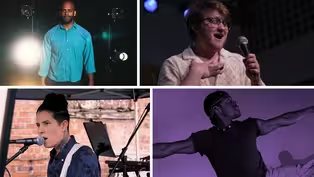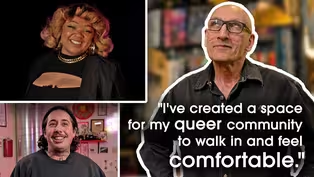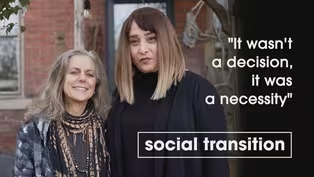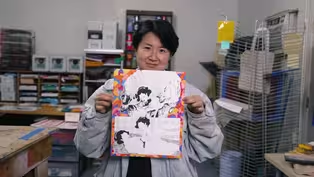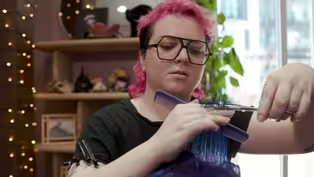
Authentic Lives: Community Care
9/18/2024 | 8m 36sVideo has Closed Captions
Hear from the LGBTQIA+ community about healthcare access challenges and the Pittsburgh organizations
Access to safe and affirming healthcare has historically been a challenge for the LGBTQIA+ Community. In this episode of Authentic Lives, we'll hear firsthand from community members about their experiences trying to gain access to much needed medical care, and from providers who make that care possible.
Problems playing video? | Closed Captioning Feedback
Problems playing video? | Closed Captioning Feedback
More Local Stories is a local public television program presented by WQED

Authentic Lives: Community Care
9/18/2024 | 8m 36sVideo has Closed Captions
Access to safe and affirming healthcare has historically been a challenge for the LGBTQIA+ Community. In this episode of Authentic Lives, we'll hear firsthand from community members about their experiences trying to gain access to much needed medical care, and from providers who make that care possible.
Problems playing video? | Closed Captioning Feedback
How to Watch More Local Stories
More Local Stories is available to stream on pbs.org and the free PBS App, available on iPhone, Apple TV, Android TV, Android smartphones, Amazon Fire TV, Amazon Fire Tablet, Roku, Samsung Smart TV, and Vizio.
Providing Support for PBS.org
Learn Moreabout PBS online sponsorshipMore from This Collection
Authentic Lives: How Performance Shapes Identity
Video has Closed Captions
LGBTQIA+ community members have had a long history of involvement in arts and entertainment. (10m 11s)
Authentic Lives: Business and Community
Video has Closed Captions
LGBTQ+ owned businesses provide safe havens, while also developing community and culture. (7m 48s)
Authentic Lives: Social Transition
Video has Closed Captions
For much of the transgender community, first steps in transitioning are relatively small. (8m 21s)
Authentic Lives: Art, Expression, and Identity
Video has Closed Captions
Art is often an expression of one’s true self, a medium utilized by many queer individuals (7m 20s)
Video has Closed Captions
Meet three hairstylists with great respect, care and understanding of their queer clients. (6m 18s)
Providing Support for PBS.org
Learn Moreabout PBS online sponsorship- This program was made possible with major funding from Central Outreach Wellness Center - Support is one of the best way to heal wounds.
To have that group of people that know, that are gonna follow through, they're gonna take your hand, say it's okay.
- We wanna reflect the people that we serve, to be sure that you know that you're understood.
You can just be you and know that you'll be accepted.
- This is life-saving medicine for us.
Every single day, a life is saved, because they're able to get what they need.
That's gender affirming care.
A lot of queer folks, a lot of trans folks die every single day because they're not getting the care that they need.
A lot of trans people are dying because they're not getting the gender affirming care that they need.
Even when we still have access, they take it away.
- Sometimes there's some tough places out there in the world.
There's places where we're not always accepted for who we are and not always celebrated for who we are.
- For a person to be able to get their gender affirming care is just like a person who needs to have a knee replacement.
If they don't get that knee replacement, then they might not be able to ever walk again.
You know, and it, and their mental health will decline.
- If you had to go to an outside pharmacy, you have to explain yourself, or you might get deadnamed or someone isn't gonna use your pronouns and that can be really frustrating.
Or you have to tell them the medication that you're on and somebody's gonna look at you funny for it.
- And there's just so many, so many just nos and not a lot of yeses all the time.
So you're just constantly fighting.
- It's a responsibility to make people aware, and that's hard sometimes because it's hard to be your authentic self and make people aware of some really grim things.
I landed in the West Village in 1981, a little bit after the epidemic started.
After a while, it was very stark, realistic, sometimes brutal, that I had friends that were going to funerals three times a week.
Not only does it bring your psyche down, but it brings the community psyche down.
I took the test and when the results came back, I was not surprised.
The person that administered the test said to me, oh, so you tested positive and you're gonna die and here's a book you can read that might help.
It's an older book, so it might not all be correct information, but good luck.
And that was it.
You know, then you go through the stages of grief, you know, how did this happen to me?
Why did this happen to me?
It shouldn't have happened to me.
And then you learn to accept it and at that time, accepting it, there was not a lot to hang on to.
With every choice you make, particularly medically, you're also dealing with a possible medical outcome later, and we're assured by the drug companies that there's little effect.
But you know, I took a drug called AZT in the late eighties because of that, I have a bad liver and I need a liver transplant.
It's not just HIV, they're treating, it's the outcomes and the effects of HIV, which in some ways are a lot worse.
- When we're talking about the HIV epidemic, it's the stigma.
They'll find ways to pull back funding.
When we're talking about any type of gender affirming care, it's more so geared from the politicians and all of the rhetoric that they are pushing out there against us.
- I think even the public aren't aware of how much it's still a a fabric of everybody's life.
- That stigma is going to be there always.
- It takes a long time to even start getting people to become your ally and you have to accept time and patience, but always have a voice - For me, creating TransYOUniting was more so of just seeing the need in the community as a black trans woman and not having that growing up, just being discriminated against within the workforce and knowing what we deal with on a day to day basis.
I wanted to create something that not only give people skills to succeed, but also have a place that we can call our own.
A lot of folks, especially within the trans community, when they're coming to get those resources, you might not see 'em again for a long time because we're trying to thrive and survive.
We need to come to one place and be able to get the services that we need.
- Central Outreach is an L-G-B-T-Q clinic, but we also treat people living with HIV and we do primary care for those focused communities.
Our mission is to really make healthcare as easy as possible for you and accessing your medications is part of that.
Joe?
- Yeah.
- Come on back.
For almost every patient we're gonna assess their STI screening needs.
We can do mental health care as well.
We have a behavioral health team, and then we do some case management, as well for helping people to get insurance and accessing resources and community.
Hello, how are you?
We know that patients are going to access care in any way that they possibly can, and we wanna be available for that.
So we have scheduled appointments, we have walk-in availability, a street outreach program, and then we have outreach that we do in places like bars and other venues, events and things like that, where we do STI screening outreach.
Alright, so what's bringing you to our clinic today?
It is really important to have everything in sort of a one stop shop because then it's one less place that you have to go, one less place that you have to get transportation to, and you know it's really important to have a pharmacy here who's gonna be supportive and accepting of you so that when you're in line for your medications and you have to tell them what you're here for or something like that, you don't have to worry about judgment from others.
These are your friends, these are your family, these are the people that you love.
If you're someone who's lived the same experience as the person who's sitting across from you, then there's already an understanding.
- Just being able to be in a space and commune with, you know, fellow folks like you, you know, that can understand what you've been through, where you're at, and just have a conversation.
- One of the great things is that we have lots of providers here so you can find the person that's the best match for you where you can really take a journey on, on your healthcare together and not feel like it's just this doctor telling you what to do.
This should be a partnership, and so hopefully you can find that person here who's gonna be your partner.
- We've been given more options.
We've been given more options to stop the infection from entering our bodies.
We've also been given more options on treatment, if I am HIV.
- You know, every year, every day we're progressing.
A lot of folks wanna be popcorn, they wanna be microwaveable.
It's like no, take your time, take your time.
Take your time.
Any person who talks to me at all, whatsoever, about medically transitioning, I always tell them to take their time.
Really do your research because now you can.
Back then, we didn't have no choices.
It was we was going to the black market and we were doing what we had to do.
- I love being able to serve my community.
I was raised with this value of service to others, and so I knew that was going to be part of my career in some way to care for the people that I love, the people that I see on a regular basis, my friends, the people that I walk by at the grocery store, something like that.
That's what's important to me.
- It was so worth the hard work to get there.
It's not really about me or it's not about me and my therapy.
It's about really, it's about making sure our community is better and has the support to deal with it.
I feel like it's part of my family and it's part of my treatment too, for that matter.
- This program was made possible with major funding from Central Outreach Wellness Center.
Support for PBS provided by:
More Local Stories is a local public television program presented by WQED
